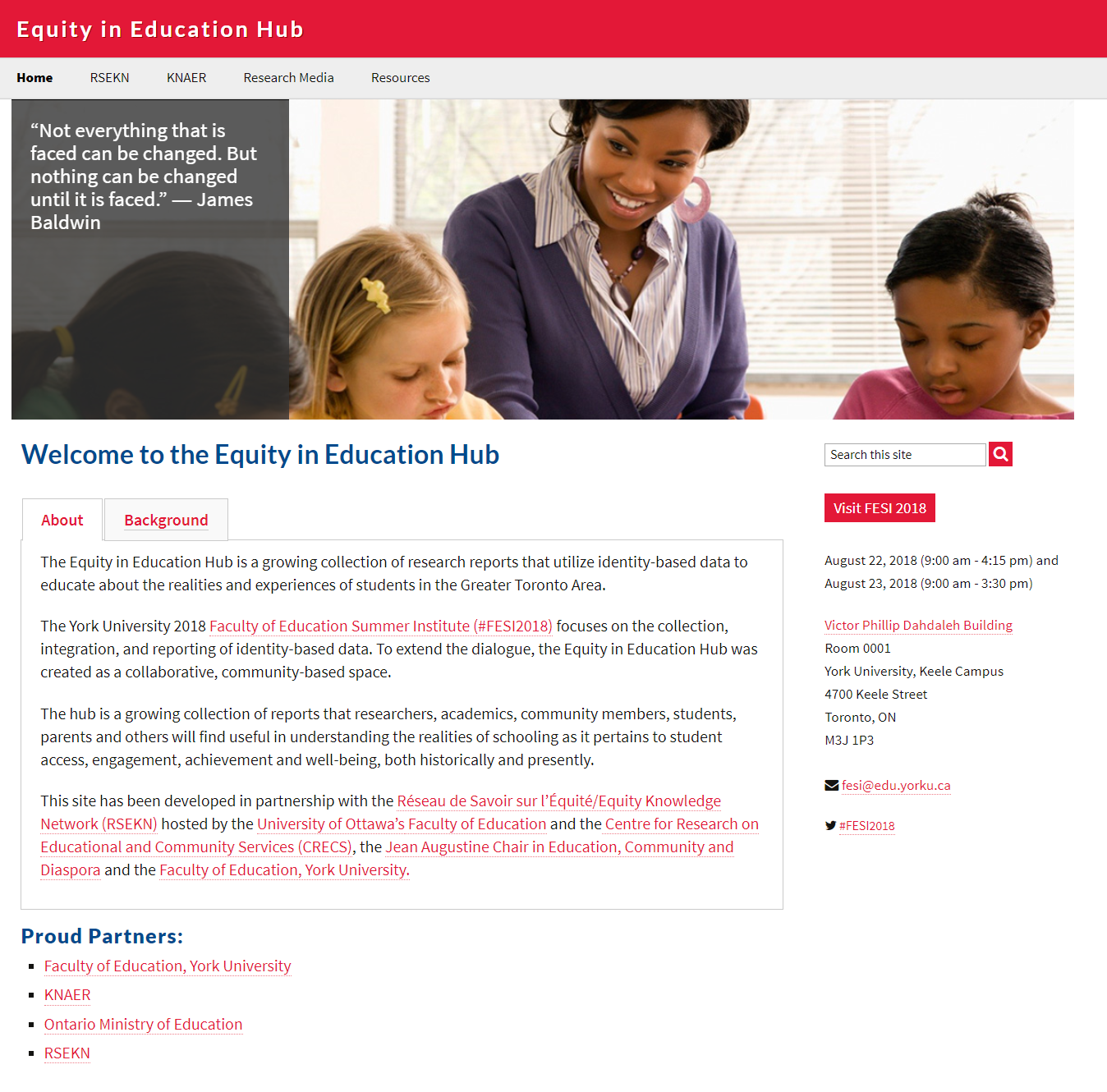The Faculty of Education held its annual Summer Institute this year on August 22 and 23—housed at York U’s Keele campus. FESI/RSEKN2018’s central focus of conversation explored the role that identity-based data plays in uncovering systemic barriers. Entitled Realities in Data: Who counts … What counts … Who’s counting? and facilitated in partnership with the Réseau de Savoir sur l’Équité|Equity Knowledge Network (RSEKN), the 2018 Summer Institute discussed and debated the significance of the connections that exist between identity-based data and what it means for student access, engagement, achievement and well-being.
“We received tremendous feedback from participants and presenters about the energy at the conference, which is only possible when multiple voices—both complimentary and contradictory—take up space in a legitimate way around one key theme,” says Education Professor Vidya Shah, who co-led the event. “Students, families and communities whose lived experiences illuminate the data, especially those most marginalized in and by the system, need to be included in meaningful and authentic ways at every stage of identity-based data collection, integration and reporting.”
Education Course Director Ixchel Bennett, who also co-led the event notes its rich discussion challenged how data was being used and how it is being collected, as well as what questions are being asked and how the information is relayed back to the community. “Jade Hugeguin, a Métis researcher from the Ontario Federation of Indigenous Friendship Centres, brought up a good point,” Bennett adds. “She said, ‘we go to the community to ask questions, we collect data on them, we analyze the data and then we call it equity because we do it in a respectful way. However, the hope is that we start seeing the community as the researcher.’”
Following the opening of the conference by Indigenous Elder Laureen Blu Water and a welcome from Dean Lyndon Martin and RSEKN, FESI2018 began with a keynote panel consisting of Jean Augustine Chair in Education, Community & Diaspora Carl James; Senior Education Researcher at the National Office of the Canadian Centre for Policy Alternatives Erika Shaker; and Indigenous Education Advisor to the Premier of Ontario and to the Ontario Minister of Education Kahontakwas Diane Longboat. Each panelist extended their findings and experiences in education to highlight the central themes and questions guiding their respective research foci.
“If we are to truly move towards more inclusive, flexible and responsive classrooms—including massive destreaming initiatives—we need to ensure our educators are equipped to help make this successful and make a concerted effort to identify and promote more effective mechanisms for community engagement on a larger scale, and more effective tools to consolidate this research” Shaker says. “Policymakers need to rethink their methods of ensuring and eventually determining success measurements, which also requires a full overhaul of the funding formula because of how it drives so many of the structural decisions about staffing, class size, school upkeep, transportation, programming, and so on.”
James, who first founded and launched the Faculty of Education Summer Institute in 2008, says compared to prior years, the theme of identity-based data this year had a deliberate meaning for a number of school boards. “The Institute will continue to want to bring together people: teachers, educational administrators, youth workers and policymakers to continue having conversations about issues related to students and young people generally,” he said. “I think that is something people should always know, and try to pay attention to—and why they should also come to the Summer Institute next year.”
Further, the fact that a number of school boards are now moving forward with identity-based data collection, for Jack Nigro, Superintendent of First Nations Métis and Inuit Education, Kawartha Pine Ridge District School Board, made the conference “real.” He says: “in the past, we were aspiring to this and presenting arguments in support of it. This time, the focus was making it happen and how to use the data so that it actually makes a difference to students and families.”
“It is now up to district school boards to do the necessary things such as consult community stakeholders, collect the data, analyze it, and, most importantly, make strategic system changes to make a difference for those who have traditionally not been well served by the system,” Nigro adds.
“On day two of the institute, the community panel made participants question how much student data we actually need before we make changes,” Bennett recalls. “What data is required to make those changes? Is it just data from boards? What about community data? These questions challenge all to think about what we do, why we do it, and how we do it. All stakeholders have a role in turning data into action. We need to shift our thinking from a hierarchal pyramid to a flattened collective that centers responsibility towards each other.”
Following the success of FESI/RSEKN2018, Shah and Bennett have already begun to brainstorm on a potential focus for FESI/RSEKN2019. The advent of the new Equity in Education Hub spearheaded in accordance with this year’s Summer Institute will play a pivotal role in gathering community reports, data and additional research that will help frame the most important conversations for next year’s event.
“There are many ideas that have been shared by FESI/RSEKN committee members, presenters and participants,” adds Shah. “One idea that is emerging is Systems of Transformation, which explores existing and emerging models for holistic, equity-minded and systemic change. This includes models of self-governance for Indigenous peoples, inclusive design, and exploring relationships between the Self and the system. “The committee will come together in the Fall to brainstorm for FESI/RSEKN 2019.”
Members of Ontario’s education community are invited and encouraged to submit their respective research and add to the conversation next year through the Equity in Education Hub.
Written by Anderson Coward

Anderson Coward
Faculty of Education, York University

